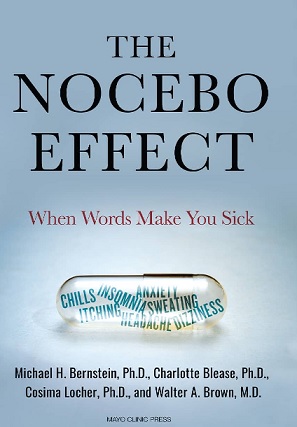Uppsala University
In a new book, experts from various fields explore the nocebo effect: how negative health expectations can make a person ill. This is the first time a book has been written on this subject.
The Nocebo Effect: When Words Make You Sick
by Michael Bernstein Ph.D. (Author), Charlotte Blease Ph.D. (Author), Cosima Locher Ph.D. (Author), and one more
An investigation into the nocebo effect, the evil twin of the placebo effect.
Can beliefs make you sick? Consider the "June Bug" incident at an American textile factory in the early 1960s. Many employees began to feel dizzy, nauseous, and vomited. Some were even hospitalized. The illness was attributed to a mysterious bug biting the workers. However, when the CDC investigated the outbreak, no bug or other cause of the illnesses could be identified. Instead, it appeared to be a mind-caused illness, triggered by expectations.
The story of the June Bug is one of many striking examples of the nocebo effect, a phenomenon best summarized as the occurrence of harm due to expecting it. The nocebo effect influences the side effects of some of the most commonly prescribed medications. It provides a lens to understand how sensationalist media reports that raise alarms about public health could even become a self-fulfilling prophecy. It might even explain the mysterious symptoms associated with Havana Syndrome, during which dozens of U.S. government employees became ill after allegedly being exposed to an unidentified sound wave in Cuba.
We are just beginning to uncover the power behind this effect and how it can be ethically mitigated. Enlightening and surprising, The Nocebo Effect is the first book dedicated to investigating this fascinating phenomenon by leading experts in the field.
"I think it´s the idea that words really matter. It´s fascinating that the way we communicate can affect the outcome. Communication in healthcare is perhaps more important than the patient recognizes," says Charlotte Blease, a researcher at the Department of Women´s and Children´s Health at Uppsala University.
Along with colleagues from Brown University in the United States and the University of Zurich in Switzerland, she co-wrote the book The Nocebo Effect: When Words Make You Sick. The nocebo effect is sometimes called the evil twin of the placebo. A placebo effect occurs when a patient believes they feel better due to receiving a treatment, and part of that perception is due to positive expectations rather than the treatment itself. The concept of the nocebo effect means that harmful things can happen because a person expects them, either consciously or unconsciously. This is the first time the phenomenon has been addressed in an academic book. Researchers in medicine, history, culture, psychology, and philosophy have examined it from their particular perspectives.
"It’s a very new field, an emerging discipline. Although the nocebo effect has been documented for a long time in history, it perhaps became especially evident during the coronavirus pandemic," says Blease.
A prior study of patients during the pandemic shows that up to three-quarters of the reported side effects from the coronavirus vaccine may be due to the nocebo effect. The study involved more than 45,000 participants, about half of whom were injected with a saline solution instead of the vaccine, yet many still experienced side effects like nausea and headaches. In the book, the authors highlight that one issue that was overlooked in discussions about side effects during the coronavirus pandemic was that many of them were actually due to the nocebo effect.
"It remains to be understood whether this is due to expectations (the nocebo effect). However, it’s curious that so many participants reported side effects after not receiving any vaccine. In any case, it´s possible that some people were disheartened by what they heard about the side effects," comments Blease.
















